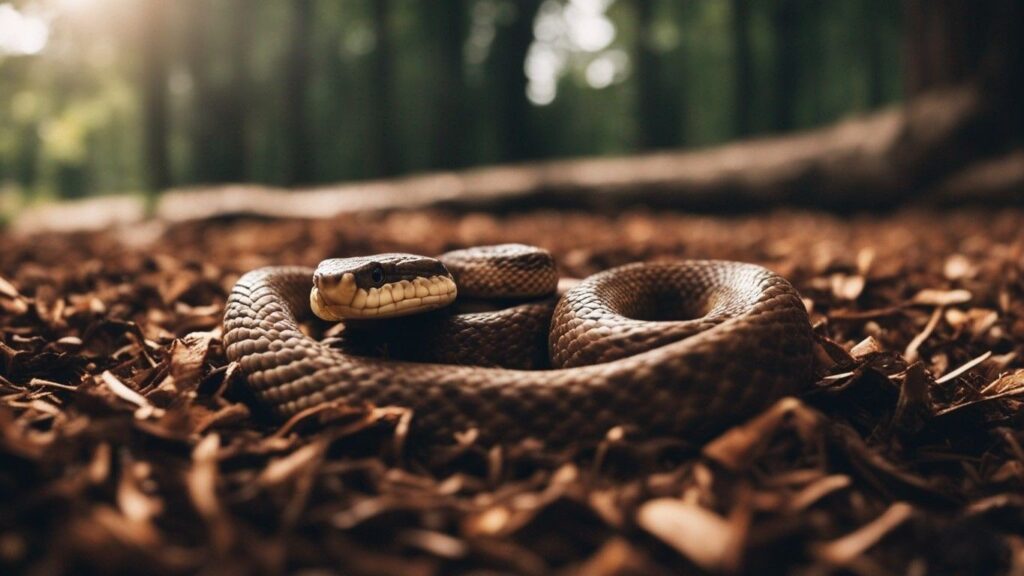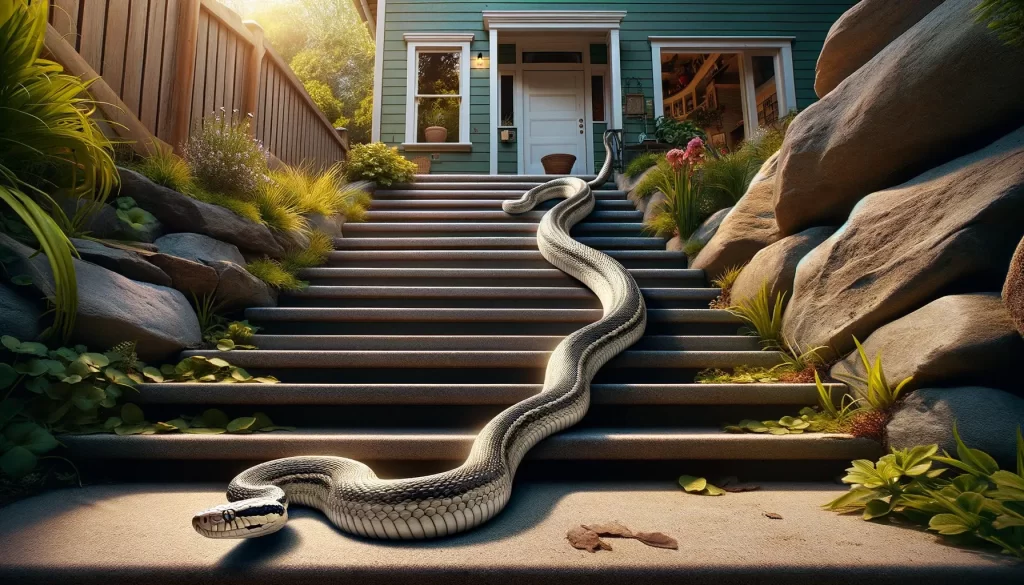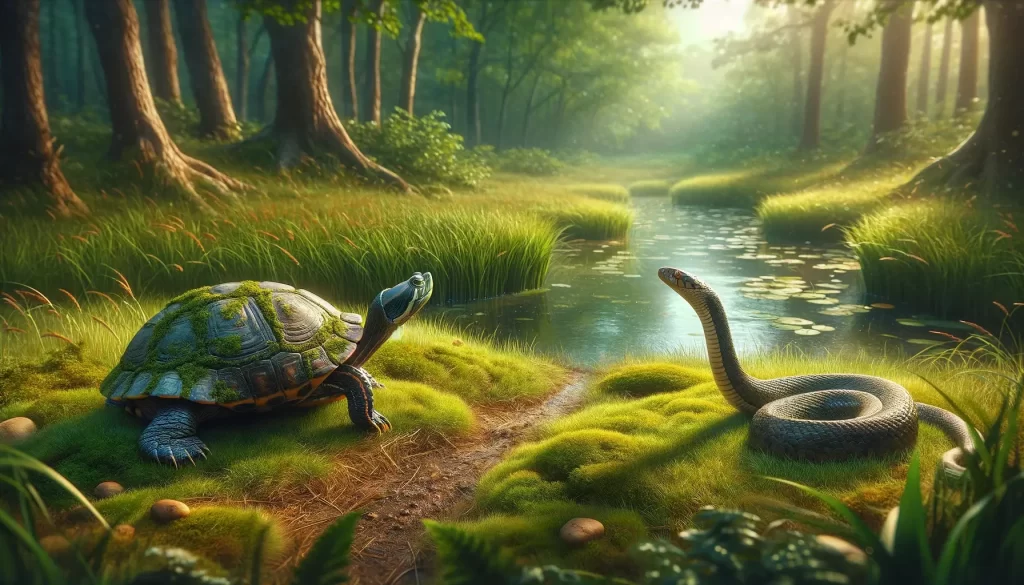So you’ve decided to spruce up your garden with some mulch, but now you’re wondering, “Does mulch attract snakes?”
It’s a valid concern, especially if you’re not fond of these slithery creatures. Well, fear not, because we’re here to shed some light on this matter.
In this article, we’ll explore whether mulch actually lures snakes into your garden or if it’s just a misconception.
Yes, mulch can potentially attract snakes as it can provide a cool, moist, and sheltered area for them to hide and find prey, such as insects and rodents. However, it is not guaranteed to attract snakes, and the likelihood may depend on the specific circumstances of the area where the mulch is placed.

What is Mulch?
Mulch is a material that is spread over the soil surface in gardens and landscapes to provide numerous benefits.
It acts as a protective covering, serving as a barrier between the soil and the external environment.
Mulch can be made from various organic or inorganic materials, such as wood chips, leaves, straw, pine needles, gravel, or rubber.
Definition of Mulch
Mulch refers to any material that is applied to the soil surface to conserve soil moisture, regulate soil temperature, suppress weed growth, enhance soil fertility, and improve the overall appearance of the garden or landscape.
It serves as a protective cover for the soil, providing a range of benefits to plants and the surrounding environment.
Types of Mulch
There are several types of mulch available, each with its own unique characteristics and benefits.
Organic mulches, such as wood chips, straw, and pine needles, decompose over time and contribute to the improvement of soil health.
Inorganic mulches, such as gravel or rubber, do not decompose and provide long-lasting weed suppression and moisture conservation.
Additionally, there are also synthetic mulches, like landscape fabrics, that can be used to control weed growth and conserve moisture.
Habitat Preferences of Snakes
Snakes, being reptiles, have specific habitat preferences that they are naturally adapted to.
Understanding these habitat preferences is essential to understanding why they may be attracted to certain environments.
Snakes’ Natural Habitats
Snakes are found in a wide variety of habitats, ranging from forests and grasslands to deserts and wetlands.
Different snake species have different habitat preferences, but common natural habitats include rocky outcroppings, brush piles, leaf litter, caves, and water bodies such as ponds or streams.
Snakes may also take shelter in burrows or hollow logs, providing them with protection and suitable temperatures for survival.
Snakes’ Preferred Environments
Snakes prefer environments that offer them suitable temperatures and ample food sources.
These environments usually have a combination of open spaces for basking in the sun and hiding places for protection.
They are attracted to areas with abundant vegetation and places to hide, such as rocks, fallen branches, or thick ground cover.
Snakes also require a steady supply of food, which includes small mammals, birds, reptiles, amphibians, and insects.
Factors that Attract Snakes
Several factors can attract snakes to a particular area. These include the availability of suitable hiding places, a diverse range of prey species, appropriate temperature conditions, and a water source nearby.
Snakes are also attracted to areas with abundant food sources, such as compost piles, bird feeders, or gardens that attract insects.
Any habitat that fulfills these requirements is likely to attract snakes, including areas with mulch.
Snakes and Mulch
Given the habitat preferences of snakes, it is worth considering whether mulch is attractive to these reptiles.
Is Mulch Attractive to Snakes?
Mulch, particularly organic mulches like wood chips or straw, can provide an attractive environment for snakes.
These materials create the perfect hiding spots and shelter for snakes to seek refuge. Additionally, the decomposition of organic mulch can also attract insects and small animals, which serve as a food source for snakes.
However, it is important to note that not all snakes are attracted to mulch, as habitat preferences can vary depending on the species.
Reasons Why Snakes May Be Attracted to Mulch
There are several reasons why snakes may be attracted to mulch, especially organic mulches.
The natural decomposition process of organic mulch creates heat, which can attract snakes seeking warmer temperatures.
Additionally, the presence of insects and small animals in the mulch can provide a steady source of food for snakes.
The moisture-retention properties of mulch also create an appealing environment, as snakes require water to survive.
Finally, the structure and density of mulch provide snakes with suitable hiding places and protection from predators.
Benefits of Mulch in Gardens
Mulch offers numerous benefits to gardens and landscapes, making it a popular choice among gardeners.
Conservation of Moisture
One of the primary benefits of mulch is its ability to conserve moisture in the soil. Mulch acts as a barrier, preventing water evaporation from the soil surface and reducing the need for frequent watering.
This is particularly beneficial in dry climates or during periods of drought when water conservation is crucial for plant survival.
Protection Against Temperature Changes
Mulch provides insulation to the soil, protecting plant roots from extreme temperature fluctuations. It helps to keep the soil cooler in hot weather and warmer in cold weather.
This temperature regulation is vital for maintaining optimal growing conditions for plants, especially those with shallow root systems.
Reduction of Weed Growth
Mulch helps to suppress weed growth by blocking sunlight and preventing weed seeds from germinating.
This reduces the competition for nutrients, water, and sunlight between weeds and desirable plants.
By reducing the need for manual weeding or the use of herbicides, mulch can significantly save time and effort in garden maintenance.
Enhancement of Soil Nutrients
As organic mulch decomposes over time, it enriches the soil by gradually releasing nutrients.
The decomposition process introduces organic matter, which improves soil structure, increases nutrient availability, and promotes beneficial microbial activity.
This results in better plant growth and healthier soil ecosystem.
Improvement of Aesthetic Appeal
Mulch enhances the overall appearance of gardens and landscapes by providing a uniform and tidy surface.
It helps to create a visually appealing backdrop for plants, highlighting their colors and textures.
By giving the garden a polished and well-maintained look, mulch contributes to the aesthetic value of the outdoor space.
Snakes That May Be Found in Mulch
While not all snake species are attracted to mulch, there are some common species that gardeners may encounter in mulch beds.
Common Snake Species Associated with Mulch
Garter snakes (Thamnophis sirtalis), rat snakes (Elaphe spp.), and gopher snakes (Pituophis catenifer) are among the most commonly encountered snake species in mulch and garden areas.
These harmless snakes are known for their adaptability and can often be found near human habitation, including mulch beds.
Identification and Characteristics of These Snakes
Garter snakes are slender with distinct longitudinal stripes running down their bodies.
They are commonly green or brown with yellow or red stripes and can range in size from one to four feet in length.
Rat snakes, also known as corn snakes, have a similar physique and can reach up to six feet long.
They are typically brown or gray with dark brown or reddish-brown blotches along their backs. Gopher snakes are larger, with adults reaching lengths of up to seven feet.
They are pale brown or yellowish with dark brown or black blotches and have a triangular head, similar to rattlesnakes.
Potential Dangers of Snakes in Mulch
While most snake encounters are harmless and serve as a reminder of nature’s presence, there are potential dangers associated with snakes in mulch areas.
Snake Bites
The main concern when it comes to snakes is the risk of snake bites. While many snake species are non-venomous and pose no serious threat to humans, there are venomous snakes that can cause harm.
Venomous snakes, such as rattlesnakes, copperheads, and coral snakes, should be approached with caution.
Effects of Snake Bites
The effects of snake bites can vary depending on the species and the amount of venom injected.
Venomous snake bites can cause symptoms ranging from mild pain and swelling to severe pain, tissue damage, and, in rare cases, life-threatening complications.
It is important to seek immediate medical attention if bitten by a venomous snake.
Preventing Snake Bites in Mulch Areas
To prevent snake bites in mulch areas, it is important to remain vigilant and take precautions.
Avoid reaching into mulch beds blindly, especially with bare hands. Wear gloves and protective clothing when working in areas where snakes may be present.
Be cautious when placing your feet or hands in hidden areas, such as under piles of mulch or rocks.
Regularly inspect mulch beds for signs of snake activity, such as shed skins or snake tracks, and take appropriate action if snakes are identified.
Snake-Proofing Your Garden
If you are concerned about snakes in your garden, there are several measures you can take to create a snake-proof landscape.
Creating a Snake-Proof Landscape
Modify your garden to make it less attractive to snakes. Remove unnecessary clutter, such as rock piles, boards, or debris that can serve as hiding places.
Keep your lawn and garden well-maintained by regularly mowing the grass and trimming overgrown vegetation. This reduces potential hiding spots for snakes.
Physical Barriers to Prevent Snake Entry
Install physical barriers that can prevent snakes from entering specific areas. Fences made of solid materials, such as metal or wood, with no gaps or holes, can help keep snakes out of specific zones.
Make sure the fence is buried at least several inches into the ground to prevent snakes from burrowing underneath.
Snake Repellents and Deterrents
There are commercial snake repellents available that can help deter snakes from entering your garden.
These repellents usually contain natural ingredients, like sulfur or naphthalene, which emit strong odors that snakes find unpleasant.
Applying these repellents around the perimeter of your garden can discourage snakes from entering.
Landscaping Techniques for Snake Control
Certain landscaping techniques can help control snake populations. Clearing away mulch from immediate proximity to structures and creating a wide and open buffer zone can discourage snakes from approaching buildings.
Additionally, maintaining a tidy and well-kept garden with minimal hiding spots can make the area less attractive to snakes.
Safe Mulching Practices
Using mulch in your garden can be safe and beneficial if certain practices are followed.
Considering Mulch Type and Material
When selecting mulch for your garden, consider using materials less attractive to snakes. Inorganic mulches like gravel or rubber can be a better choice, as they do not provide the same desirable habitat for snakes as organic materials.
However, if using organic mulch, regularly replacing or refreshing it can reduce the attractiveness to snakes.
Maintaining a Clean Mulch Environment
Regular maintenance and upkeep of your mulch beds are crucial. Keeping the area clean and free of debris will minimize hiding spots for snakes.
Remove any dead leaves, fallen branches, or other organic matter that may accumulate on the mulch surface.
Additionally, avoid over-watering, as excessive moisture can create a suitable habitat for snakes.
Regular Inspection of Mulch Beds
Regularly inspecting your mulch beds for signs of snake activity is important. Look for shed skins, snake tracks, or any other evidence of snake presence.
If snakes are identified, take appropriate measures to discourage them from inhabiting the area.
Consider contacting a professional wildlife specialist if the snake population becomes a recurring issue.
Proper Disposal of Yard Waste
Properly disposing of yard waste can help discourage snakes from entering your garden. Remove any unused branches, leaves, or grass clippings from the garden and dispose of them away from the immediate vicinity.
Clutter-free surroundings make the area less attractive to snakes.
Maintenance of Clear Perimeter
Maintaining a clear perimeter around structures can prevent snakes from entering buildings. Trim back any overgrown vegetation near the house, seal openings and gaps where snakes might gain entry, and ensure that doors and windows are properly screened to keep out snakes and other pests.
Alternative Mulching Options
If you are concerned about snakes in your garden, there are alternative mulching options available that are less attractive to these reptiles.
Mulching Alternatives with Low Snake Attraction
Consider using inorganic mulching materials, such as gravel, stone chips, or recycled rubber mulch. These materials do not decompose like organic mulch, making them less attractive to snakes.
They also provide long-lasting weed suppression and moisture conservation benefits.
Tips for Snake-Free Gardening
In addition to choosing less attractive mulching materials, there are other steps you can take to ensure a snake-free garden.
Regularly maintain your garden, keeping it clean and free of debris. Eliminate any hiding places, such as rock piles or overgrown vegetation, that can harbor snakes.
By practicing good garden hygiene, you can minimize the likelihood of snakes inhabiting your outdoor space.
Non-Organic Mulching Materials
If you prefer to avoid organic mulches altogether, consider using non-organic alternatives such as landscape fabrics or plastic sheeting.
These materials can effectively suppress weed growth while providing a barrier between the soil and the external environment.
However, be aware that non-organic mulches may not offer the same soil improvement benefits as organic mulches.
Final Thoughts
Mulch is a valuable tool in gardening and landscaping, offering a range of benefits such as moisture conservation, temperature regulation, weed suppression, soil enrichment, and aesthetic appeal.
While mulch can create an environment that may attract snakes, it is important to remember that not all snake species are attracted to mulch, and the risk of encountering snakes can be minimized by following safe practices and taking appropriate preventative measures.
By understanding the habitat preferences of snakes and implementing snake-proofing techniques, you can safely enjoy the benefits of mulch in your garden or landscape.




